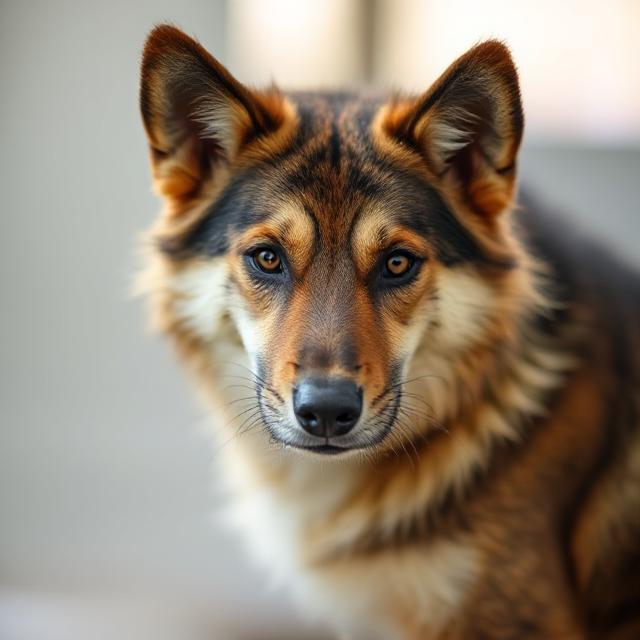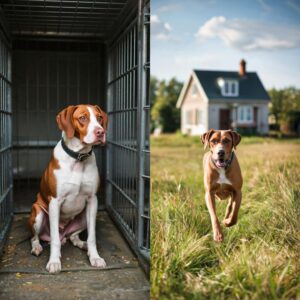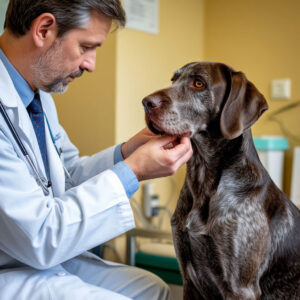Comprehensive Care Protocols for Rescued German Wirehaired Pointers
Bringing home a rescued German Wirehaired Pointer (GWP) is a rewarding experience, but it comes with unique challenges. Many of these dogs have faced neglect, abuse, or abandonment. Specialized care is needed to restore their health and confidence. There are protocols in place to provide health assessments, behavioral rehabilitation, and more to ensure your rescued GWP will thrive in their new home.
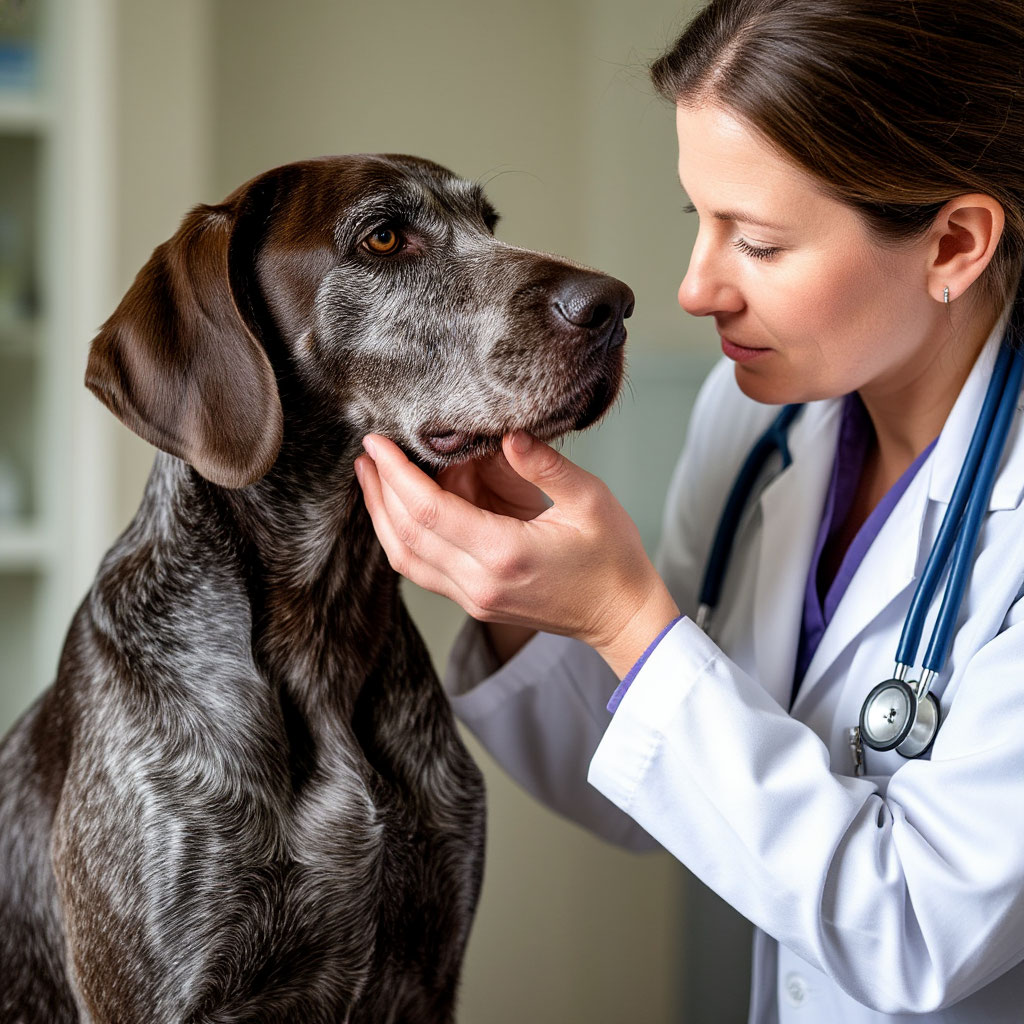
Initial Health Assessment for German Wirehaired Pointer Rescue Dogs
Bringing home a rescued German Wirehaired Pointer (GWP) is an exciting and heartwarming experience, but it’s important to start with a thorough health check. Many of these dogs come from tough backgrounds—some were neglected hunting dogs, while others may have suffered abuse or abandonment. A proper initial assessment helps catch hidden health issues early and sets the foundation for their recovery.
Think of this as your GWP rescue dog health checklist—a simple but essential guide to ensuring your new companion gets the care they need from day one.
The First Vet Visit
Before anything else, schedule a full veterinary exam. Even if your German Wirehaired Pointer rescue looks healthy, underlying problems (like parasites or old injuries) might not be obvious. Here’s what the vet will likely check:
Parasite Screening
Many rescued dogs have fleas, ticks, or intestinal worms. A fecal test and blood work can detect hidden infestations that need treatment.
Dental Check
Neglected GWPs often have dental issues—tartar buildup, broken teeth, or gum disease. Painful mouths can affect eating and overall health, so a dental cleaning might be necessary.
Joint & Muscle Evaluation
Since GWPs are active hunting dogs, they may have old strains, arthritis, or muscle atrophy. The vet will check for limping, stiffness, or signs of past injuries.
Blood Work & Lab Tests
A basic blood panel helps spot infections, anemia, or organ problems. It’s especially important if your dog was malnourished or lived in poor conditions.
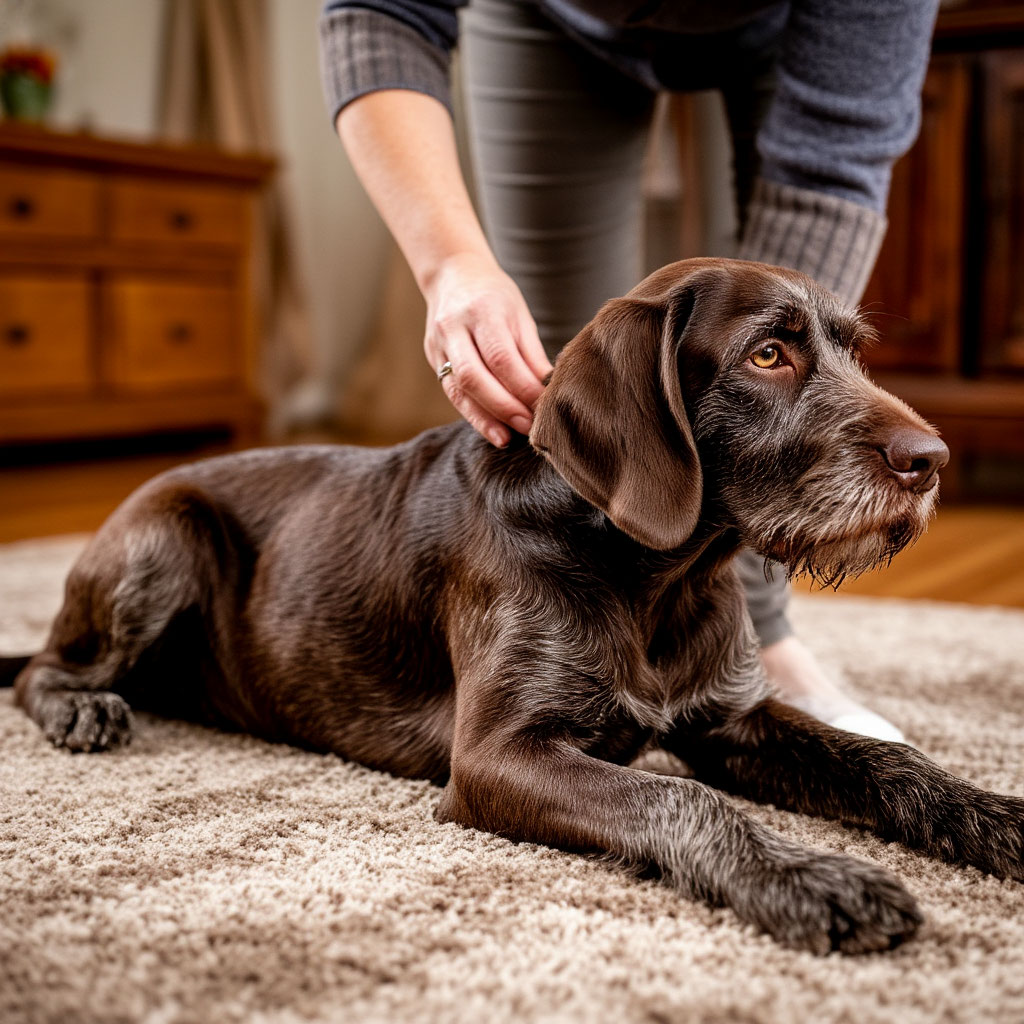
At-Home Health Observations
Bringing home a German Wirehaired Pointer rescue requires careful attention to their physical and emotional well-being. In the first days, observe their skin and coat closely—flakiness, bald patches, or irritation may indicate past neglect. These signs call for structured skin/coat recovery protocols, such as vet-approved shampoos or dietary adjustments.
Weight and muscle tone reveal much about their history. A malnourished GWP rescue might have visible ribs or a sunken appearance, requiring gradual nutritional rehab for neglected hunting dogs. Conversely, overweight dogs need portion control and balanced meals. Track their eating habits—hesitation or rapid gulping could signal digestive discomfort.
Behavioral cues are equally important. Watch for signs of Pointer anxiety management needs, like excessive pacing, whining, or avoidance. These reactions are common after rescue and improve with patience. Limit high-intensity activity with exercise restrictions for abused GWPs to prevent strain while they regain strength.
Maintain a detailed GWP rescue dog health checklist, noting changes in energy, appetite, or mobility. Early detection of issues—like stiffness or reluctance to move—helps tailor their care plan. Consistent monitoring ensures your German Wirehaired Pointer rescue transitions smoothly into their new life.
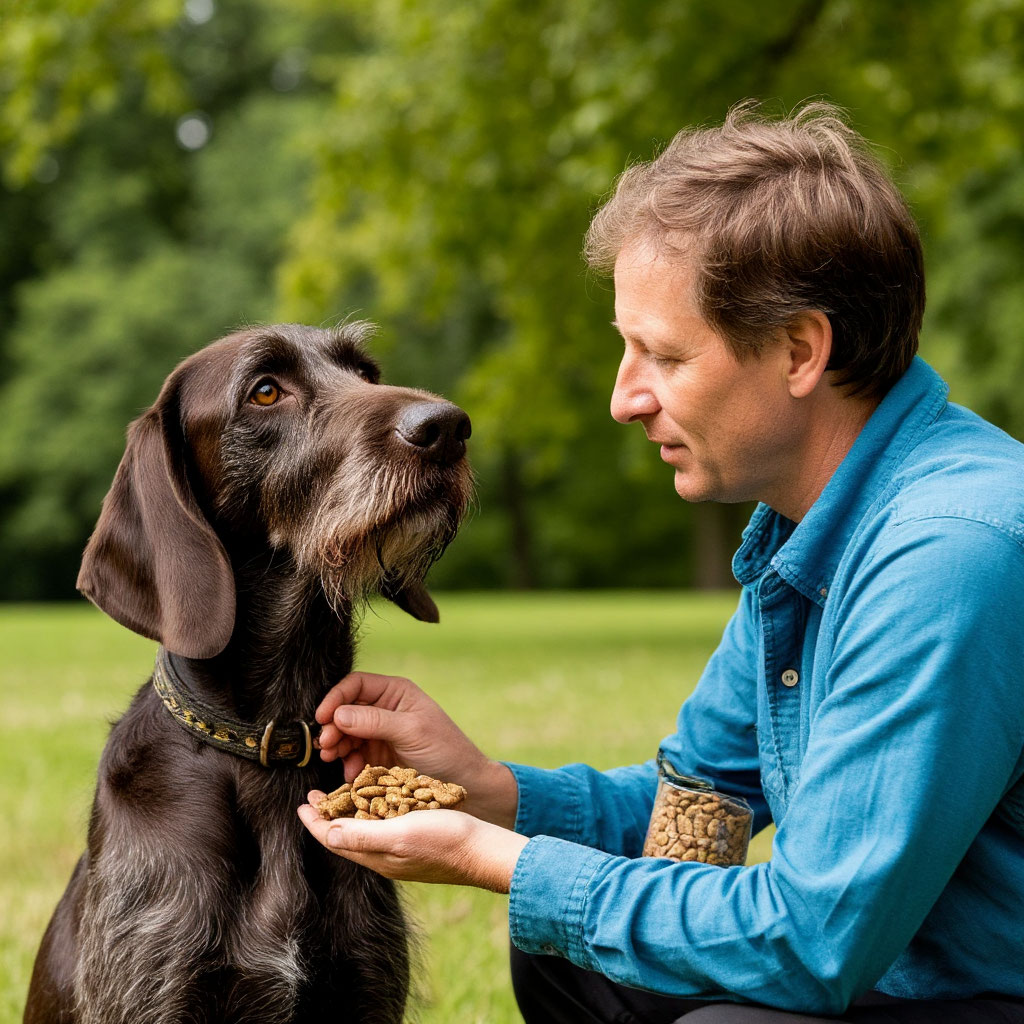
Immediate Care Adjustments
Based on the vet’s findings, you might need to:
- Start parasite prevention (monthly flea/tick/heartworm meds).
- Transition to a high-quality diet slowly (sudden changes upset their stomach).
- Begin gentle exercise restrictions if they have joint issues.
A solid initial health assessment is the best way to set your German Wirehaired Pointer rescue up for success. Catching problems early means faster recovery and a smoother transition into their new life. Once the vet gives the all-clear, you can focus on building trust, improving their diet, and helping them feel safe. Remember, every small step counts—your patience now will lead to a happier, healthier companion in the long run.
Behavioral Rehabilitation After Rescue
Bringing a German Wirehaired Pointer rescue into your home requires patience and structured support to help them overcome past trauma. Many rescued GWPs exhibit anxiety, fearfulness, or uncertainty due to neglect, abandonment, or poor treatment. Implementing proper behavioral rehabilitation techniques is essential for building confidence and trust.
Aspects of Behavioral Rehabilitation
| Challenge | Solution | Implementation Tips |
| Pointer anxiety management | Create predictable routines & safe spaces | Use calming aids (thundershirts, pheromone diffusers) |
| Fear of humans | Positive reinforcement training | Reward calm behavior with high-value treats |
| Leash reactivity | Desensitization exercises | Start in low-distraction environments |
| Resource guarding | Trade-up games | Exchange guarded items for better rewards |
Pointer Anxiety Management
Rescued GWPs often struggle with anxiety after rescue. Sudden noises, new environments, or unfamiliar people can trigger stress responses. Counter-conditioning helps reshape their emotional reactions. For example, pair scary stimuli with treats to create positive associations.
Rebuilding Trust Through Routine
Consistency is vital for a German Wirehaired Pointer rescue. Feed, walk, and train at the same times daily. Avoid overwhelming them with too many new experiences at once. Let them adjust at their own pace.
Exercise Restrictions for Abused GWPs
While GWPs are high-energy dogs, those with traumatic pasts may need modified activity. Avoid forced running or long hikes until they build physical and mental stamina. Instead, use mental stimulation—scent games, puzzle toys, and short training sessions—to tire them out safely.
Socialization After Rescue
Introduce new people and animals slowly. Let the dog initiate contact and retreat if uncomfortable. Controlled playdates with calm, well-socialized dogs can help rebuild social skills.
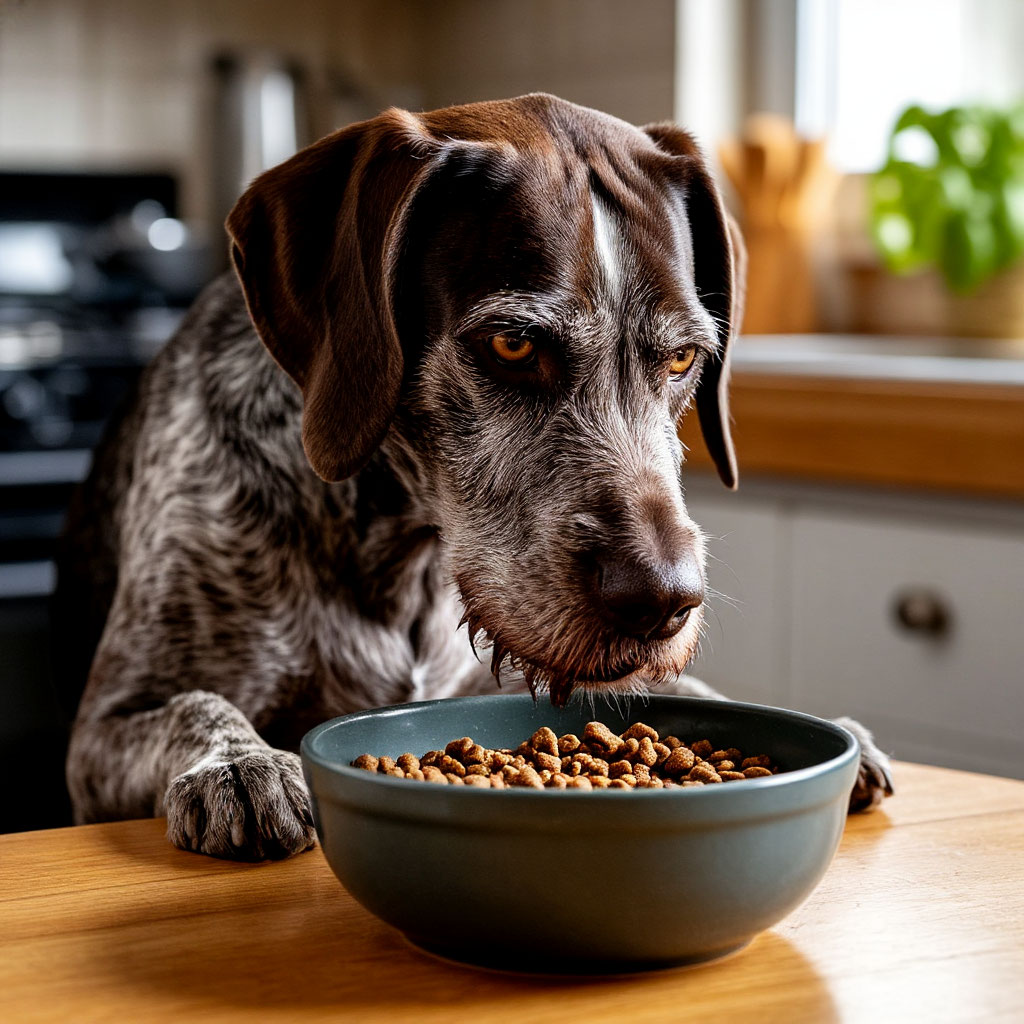
Nutritional Rehab for Neglected Hunting Dogs
Nutritional Rehabilitation for a German Wirehaired Pointer Rescue
Many German Wirehaired Pointer rescues arrive with significant dietary deficiencies from their time as neglected hunting dogs. Proper nutritional rehabilitation requires careful planning to restore their physical condition without overwhelming their system. These athletic dogs need tailored meal plans that address both immediate recovery and long-term health.
Critical Components of Dietary Recovery
High-Quality Protein Sources
Muscle atrophy is common in underfed GWPs. Incorporate easily digestible proteins like chicken, turkey, or fish to rebuild lean mass. Avoid sudden changes to prevent digestive upset.
Balanced Caloric Intake
Underweight dogs need gradual calorie increases – typically 10-15% weekly. Overweight rescues benefit from measured portions with fiber-rich vegetables to promote satiety.
Essential Supplements
Omega-3 fatty acids support skin/coat recovery protocols, while probiotics improve gut health. Joint supplements may be necessary for older hunting dogs with wear-related issues.
Hydration Management
Dehydrated rescues often need electrolyte-enhanced water initially. Always provide fresh water, monitoring intake closely during recovery.
Feeding Schedule
Small, frequent meals (4-5 daily) prevent bloating in emaciated dogs. Use slow-feed bowls if gulping becomes problematic.
Transition Period
Allow 7-10 days when switching foods. Mix increasing amounts of new food with their current diet while observing stool consistency.
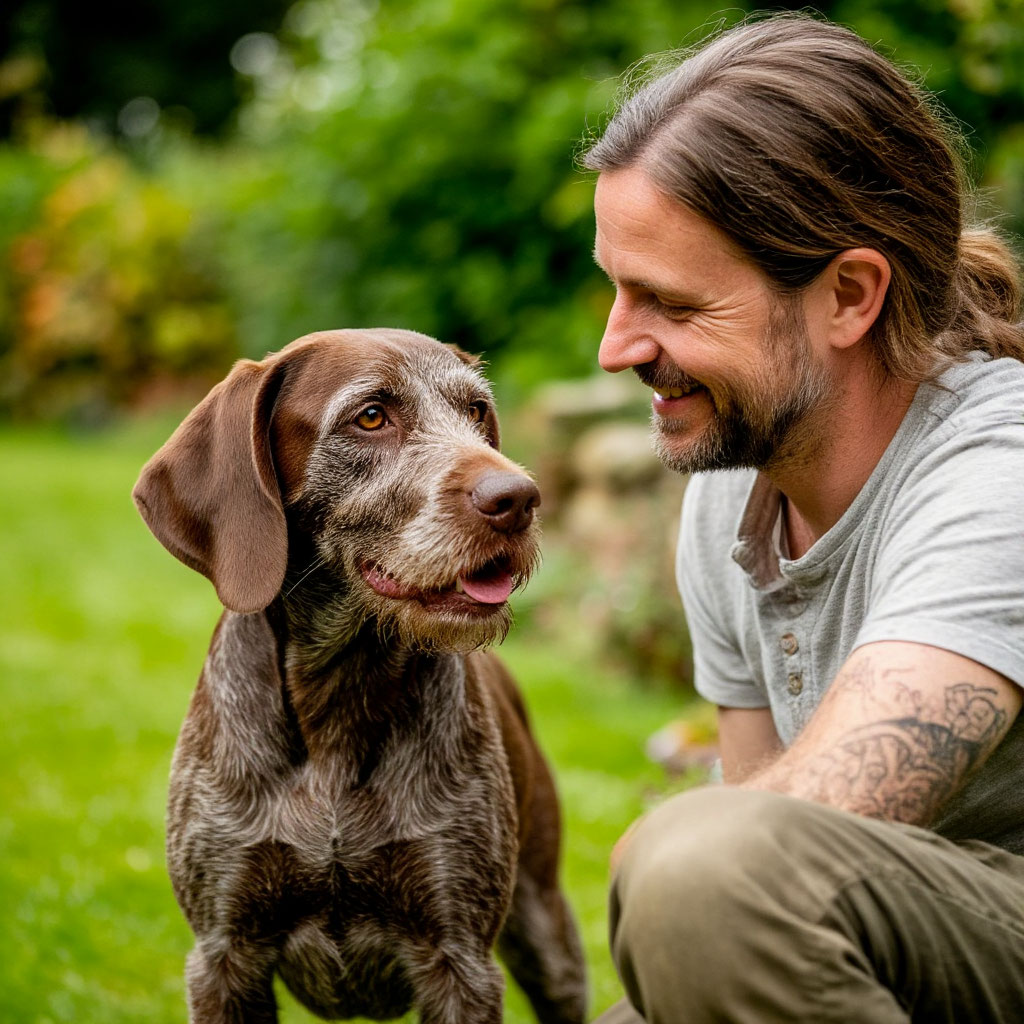
Long-Term Care and Bonding
Building a strong relationship with your rescued German Wirehaired Pointer requires ongoing commitment after the initial adjustment period. These intelligent, energetic dogs thrive on structure and meaningful interaction, making ongoing care essential to their well-being.
Establishing trust is the foundation of your bond. Many rescued Pointers need time to fully relax in a new environment, so avoid forcing interactions. Instead, allow them to approach you voluntarily, using gentle encouragement and rewards. Patience at this stage will pay off in deeper interactions later.
Maintaining physical health remains important throughout their lives:
- Have regular veterinary checkups to monitor for breed-specific issues. These include hip dysplasia or ear infections.
- Adapt their diet as they age, ensuring they are getting the right nutrition without overfeeding.
- Include joint supplements as needed, especially for former hunting dogs with years of active wear and tear.
Mental stimulation prevents boredom and destructive behavior. Vary challenging activities like nose work, obedience training, and interactive toys. This approach keeps their mind sharp while reinforcing your leadership role. Vary their walks to provide new smells and sights that satisfy their natural curiosity.
Socialization should continue gradually throughout their lives. Well-managed exposure to different environments, people, and animals helps maintain their confidence. Watch for signs of discomfort and adjust experiences accordingly, always prioritizing their emotional safety over forced interactions.
A journey with a German Wirehaired Pointer rescue dog is one that evolves beautifully over time. What begins as cautious coexistence evolves into mutual understanding and devotion. Celebrate small victories in their progress, remembering that each dog heals at their own pace. Your constant presence and attentive care give them the security they need to fully embrace their new life.
Helping a rescued German Wirehaired Pointer heal requires patience and tailored care. By addressing their health, behavior, and nutrition systematically, you’ll give them the best chance at a happy, fulfilling life. Every small step forward is a victory—celebrate the progress!
